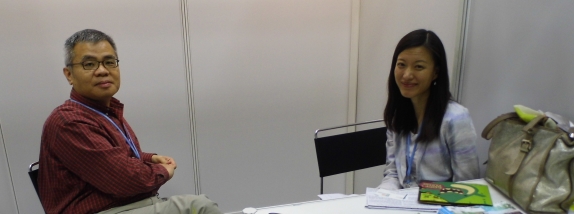|
最新消息
2012-12-05 19:24
Less is more is a climate change lesson for us all
I feel cheated at the first sight of the two giant low-emission SUVs displayed at the Doha exhibition center.
Of the two high-tech concept SUVs, one is installed with a carbon dioxide capture system, the other has a thermoelectric generator and photovoltaic film on the sunroof.
No doubt they are more environmentally friendly, than the gasoline versions. But why not just change to a smaller car? Commercializing these technologies would be incredible expensive.
Changing consumption habits is very difficult. If people can live simply, it would be not necessary for negotiators from about 200 countries to gather together to talk about a global solution for addressing climate change.
Many NGOs set up information booths and host side events during the climate change talks. A booth with a few colorful brochures with cute cartoon characters captured my attention.
The booth was displaying teaching materials made by the Environmental Quality Protection Foundation, a Taiwan-based NGO focused on climate change education.
The organization has hosted lectures at more than 200 primary schools in Taiwan. Foundation Chairman Ying-shih Hsieh, hopes 1000 schools will eventually hear the lecture.
In these lectures, the organizations staff or volunteer teachers, help the kids calculate how much water they use after getting up in the morning by going about their every day tasks, such as brushing their teeth, showering and flushing the toilet. It also includes indirect water use, such as water used for planting the vegetables that you eat and manufacturing the clothes that you wear.
They also help the kids calculate their carbon footprint. How many greenhouse gas emissions have been produced by your daily living such as your transportation, electricity use or eating.
With funny cartoon stories, and videos, children learn how the emissions are contributing to the earth's problems. They also tell the children how to reduce exposure to dioxin and the benefits of planting and protecting trees.
It's a pity that this kind of environmental education was not available when most of us were young. With such ideas taking root in their minds, I'm sure it will help the new generation adjust their lifestyle.
Although it is risky to link a single event to climate change, it has become a reality that we are seeing more extreme weather events, which have an effect on everyone's lives.
As someone living in Beijing, I experienced the extraordinarily heavy rain that swept across the city in late July, which claimed the lives of many people including a journalist in his early 30's. When the typhoon Anemones attacked Zhejiang province in August, a former colleague lost her aunt and uncle.
With its complex climate system, China is one of the countries with the most vulnerable ecological environment. China's coastal areas have witnessed significant sea level rises in recent years, with the previous three years sitting on a historic high.
According to a survey by the Center for China Climate Change Communication, about 93 percent of Chinese respondents said climate change is happening, while about three out of five respondents feel they have been directly affected by it.
The figure is higher than a survey by the Yale Project on Climate Change Communications, which found 70 percent of Americans now accept that climate change is real.
Although the two countries have individual situations, the data shows that it's widely accepted that climate change is real and public awareness is key in addressing climate change.
As two of the largest emitters in the world, both American and Chinese consumers love big cars. If Chinese consumers' income could be as high as that of the Qataris' and the price of the cars and gasoline could be as affordable as here, I have no doubt that we would have more large SUVs on the road.
Some may feel frustrated by the slow pace of the climate change talks. It's hard to influence the negotiators, but everyone can gradually adjust their own lifestyles.
A small car is enough for commuting; it indicates your awareness of climate change and your taste for a greener life; and your neighbors will follow you.
By Lan Lan in Doha, Qatar (chinadaily.com.cn)  中國國家英文日報記者藍瀾採訪本會董事長
發佈時間: 2012/12/05
|
台北辦公室 TEL:(02)2321-1155 FAX:(02)2321-1120 E-MAIL:info.eqpf@msa.hinet.net
地址:10641台北市大安區信義路2段88號6樓之1
Copyright 2008 財團法人環境品質文教基金會 All Rights Reserved
Copyright 2008 財團法人環境品質文教基金會 All Rights Reserved











